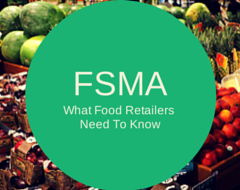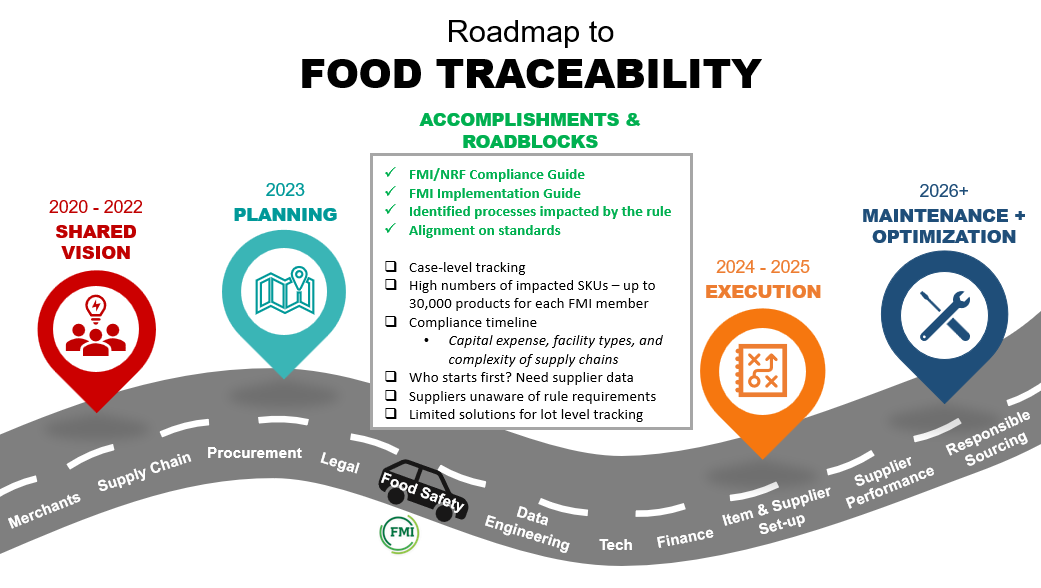By: Stephanie Barnes, Regulatory Counsel, Food Marketing Institute 
The Food Safety Modernization Act (FSMA) represents the most sweeping change to food safety laws in more than 70 years. FSMA fundamentally changes the way food is regulated in the U.S. and abroad and affects the entire supply chain from farm-to-fork. It aims to enhance the culture of food safety and requires a culture change for most food retailers, while providing consumers with important safeguards to enhance confidence in our food system.
FSMA focuses more on preventing food safety problems rather than relying primarily on reacting to problems after they occur. FSMA will have a direct impact on manufacturing facilities, central kitchens, distribution centers, food imports and even transportation. The law also provides the U.S. Food and Drug Administration (FDA) with new enforcement authorities and new tools to hold imported foods to the same standards as domestic foods. These changes will have a significant impact on food retailers and wholesalers and FMI is working diligently to provide you with the resources you need along the way.
Who is responsible for compliance?
FSMA will impact every aspect of a company and will require additional resources for training, recordkeeping, product information/traceability systems, auditors, and food safety and legal staff. FSMA also takes corporate criminal liability to a new level by holding food retail executives, notably the CEO, accountable.
When will these changes happen?
Although final rules are still pending, retailers should begin preparing for FSMA now. Some authorities have already gone into effect, such as FDA’s new authority to order companies to recall food, and others require FDA to prepare and issue regulations and guidance documents. Seven of the key regulations under FSMA have already been proposed and final rules are expected as early as August 2015.
How can we prepare now?
Food retailers and wholesalers need to start taking steps to comply, which isn’t something that can be done overnight. This includes performing an internal audit and looking along your supply chain for any potential weaknesses.
To better prepare for FSMA and its impact on food retailers, here are some key questions you should be asking:
- Do you have an internal, cross-department, senior staff-led FSMA implementation team?
- Does your company have an implementation plan or is it in the works?
- Are your warehouses/distribution centers preparing and have you talked with your wholesaler?
- Is your legal team up-to-date?
- Do your facilities need to change?
- Do you have adequate recordkeeping policies in place?
- Do you have proper employee training in place?
- Will your company be in compliance by 2016?
To help food retailers better understand FSMA’s impact on your business, FMI is dedicating a five-part series to the topic. Over the course of the next few days, we’ll dive deeper into key aspects of FSMA to outline the changes and what they mean for food retailers:
- Preventive Controls Plan
- Sanitary Transportation
- Foreign Supplier Verification Program
- Produce Safety
- FSMA Supplemental Proposed Rules


 Industry Topics address your specific area of expertise with resources, reports, events and more.
Industry Topics address your specific area of expertise with resources, reports, events and more.
 Our Research covers consumer behavior and retail operation benchmarks so you can make informed business decisions.
Our Research covers consumer behavior and retail operation benchmarks so you can make informed business decisions.
 Events and Education including online and in-person help you advance your food retail career.
Events and Education including online and in-person help you advance your food retail career.
 Food Safety training, resources and guidance that help you create a company food safety culture.
Food Safety training, resources and guidance that help you create a company food safety culture.
 Government Affairs work — federal and state — on the latest food industry policy, regulatory and legislative issues.
Government Affairs work — federal and state — on the latest food industry policy, regulatory and legislative issues.
 Get Involved. From industry awards to newsletters and committees, these resources help you take advantage of your membership.
Get Involved. From industry awards to newsletters and committees, these resources help you take advantage of your membership.
 Best practices, guidance documents, infographics, signage and more for the food industry on the COVID-19 pandemic.
Best practices, guidance documents, infographics, signage and more for the food industry on the COVID-19 pandemic.
